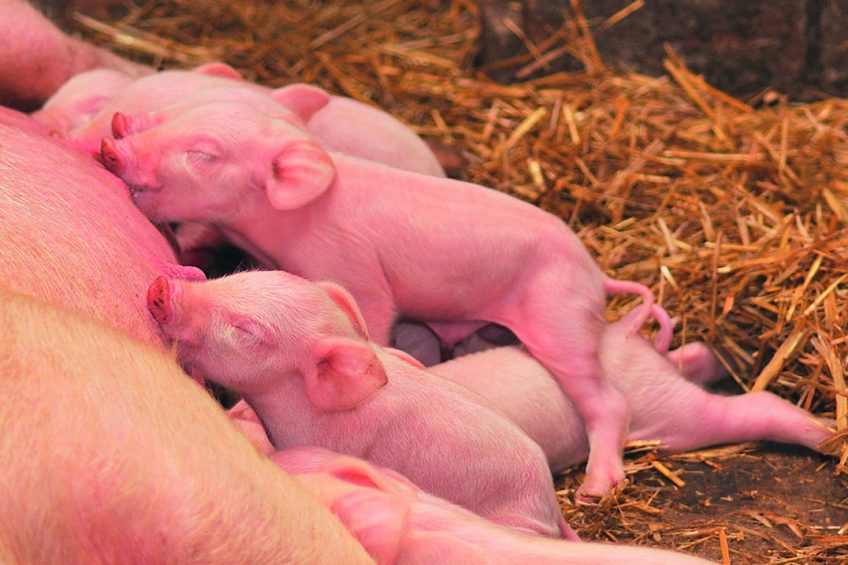Prevent intestinal inflammation to ensure piglets performance

Intestinal inflammation can impair the absorption of nutrients and up to 30% of the energy ingested is used to manage this process instead of contributing to performance. Plant extracts can help both sows and piglets taking care of intestinal inflammation.
The intestine constitutes the largest interface between the animal and its environment. An intact intestinal barrier is thus essential in maintaining gut health and preventing tissue injury and several diseases. The intestinal barrier is formed by enterocyte membranes, tight junctions, secreted mucus, and immunologic factors. Dysfunction of this barrier can be caused by different types of stress and can lead to increased intestinal permeability.
Sow and piglet challenges
Weaning is well-known as the critical period for piglets where they face multi-factorial stresses and challenges in a short time:
- Adaptation to the feed intake – The longer the time without eating at weaning, the higher the risk of diarrhoea. Effectively, that drop in feed intake is likely to cause difficulties to meet nutritional requirements due to reduction of the villi height, thus nutrient absorption area;
- Adaptation to the feed – from milk to a solid feed;
- Feed composition changes – from milk containing lactose to a pre-starter feed containing mainly or exclusively plant-based raw-materials;
- Adaptation to a new environment – separation from the sow to litter, from farrowing crate to post-weaning pen, with possible variation of the microbiota present in the environment.
Farrowing and lactation remain 2 critical periods for sows. During these periods, there is a high risk of inflammatory reaction and oxidative stress. The most visible impact of the inflammatory process for sows is the milk quantity and quality. Sows with intestinal inflammation and oxidative stress dedicate less energy for milk production, which can impacts piglet growth. Recent research explains up to 30% of the ingested energy is deviated to manage these processes.
Inflammation and plant extracts
Active ingredients from plant extracts appear to offer a solution. Wisium’s R&D department has been working on a selection of plant extracts combinations, known from centuries in the traditional Asian pharmacopeia for having individual anti-inflammatory, anti-oxidant and analgesic properties. The most powerful combination was selected thanks to its synergistic effects to create the patented product Powerjet, made of a plant from the alkaloid family and a second one from neo-lignans. The benefits of using a combination of plant extracts has been demonstrated through in vitro research and confirmed by in vivo studies.
In vitro research
A university trial was conducted in Beauvais, France, in order to assess the synergistic impact of the plant extracts on both intestinal integrity and inflammatory process. Human colon cells were cultivated and then stimulated with a severe model of inflammation (cytokines cocktail). The plant extracts have been tested alone or in combination to evaluate their impact on Trans-Epithelial Electric Resistance (TEER) and Interleukins 8 secretion (IL-8). The TEER measurement allows to assess the barrier function of epithelial cells. A high TEER value is an indicator of well-preserved tight junctions. IL-8 are pro-inflammatory markers and their productions are reflecting the level of the inflammation. With the inflammatory challenge, TEER is significantly decreased vs the negative control, meaning that the tight junctions are altered (Table 1). The addition of the combination of the alkaloids and neo-lignans plants delivers a significant improvement of the intestinal integrity whereas alkaloids alone or neo-lignans did not lead to any improvement. In signs of inflammation, basal IL-8 secretion is significantly increased. The combination of plant extracts decreased the secretion of basal IL-8 proving its ability to limit the over activation of the immune system after an inflammatory challenge where respectively alkaloids or neo-lignans alone were not able to reduce the secretion of basal IL 8. These results assess the interest of such patented combination and prove its synergistic effect on the preservation of intestinal integrity avoiding the leaky gut syndrome and on the modulation of the immune response to an inflammatory challenge.
In vivo results
The trial’s aim was to evaluate the effect plant extract supplementation added in sows and piglet diets. The trial compared the performances of 4 groups of piglets (total of 624) after weaning. The trial was conducted on 3 different batches in France. One group of sows (A) received a standard diet, and the second one (B) received the same standard diet plus the plant extracts combination from 15 days before farrowing and until weaning (total of 36 days). Piglets of both sows groups were divided into 2 groups also one with a standard piglet diet (A1, B1) and a second (A2, B2) with the plant extracts combination from 20 to 67 days of age. All the piglets had similar weights at weaning. The best performances were obtained with the group (B2) of piglets fed with the plant extracts combination in post-weaning and originating from sows fed also with it. ADG of this group of piglets was significantly improved by 11.4% (P<0.001) compared to adg of control group. the 2 best groups in terms of adg after weaning are those with the plant extracts combination in lactating diet (>Figure 1). This improvement of ADG can be explained by a better feed intake and feed efficiency.
Synergistic effects of plant extracts
Many types of stresses can trigger inflammation, oxidative stress and immune response, which can cause a lack of performance and profitability. Combining plant extracts with different properties delivers greater benefits from synergies, enabling animals to better face inflammatory and oxidative processes around sensitive and stressful periods. The combination of plant extracts (Powerjet) dedicated to swine, poultry and ruminant acts on the preservation of a gut health by preventing the leaky gut. Thus, better nutrient absorption and use by the animals occurred when they are facing a stress period generating inflammation.
Author:
Fabien Guillard, International Swine Market Manager, Wisium







